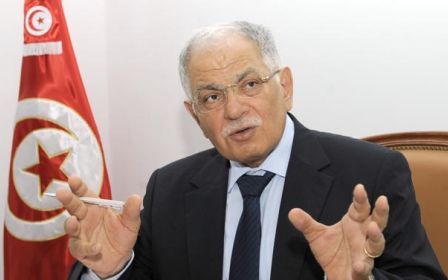Former Ben Ali opponent to run for Tunisian presidency

Ahmed Najib Chebbi, a prominent opponent of ousted Tunisian president Zine al-Abidine Ben Ali, has applied to run in presidential polls slated for November.
Chebbi, head of the liberal Democratic Progressive Party told reporters he was "quite confident of winning the race after a long struggle for freedom and dignity."
If elected president, Chebbi has pledged to defend freedoms and form a national unity government.
Tunisia's presidential election is scheduled to be held on November 23. So far, six candidates have applied to contest the race.
More than 50 politicians, including four women, have expressed a desire to run for highest office.
The Islamist Ennahda movement, for its part, had earlier said it would throw its support behind a "consensus candidate" from outside the movement.
The centre-left Democratic Forum for Labor and Liberties Party (also known as Ettakatol) said it would back the head of Tunisia's Constituent Assembly, Mustapha Ben Jafar, in the elections, while Hamma Hammami, leader of the socialist Popular Front coalition, said during National Day celebrations on 13 August that he also planned to contest the race.
The centre-left Congress for the Republic Party, meanwhile, said it would support incumbent interim President Moncef Marzouki.
Ben Ali's last foreign minister, Kamel Morjane, also said, on Saturday, that he would stand in the presidential election.
"The party's national council met yesterday (Friday) and, after examining the situation in the country, insisted that I stand in the election. I accepted," Morjane, who heads Al-Moubadara (the Initiative) party, told Jawhara FM radio station.
"I consider doing so to be a national responsibility," he added.
A statement from al-Moubadara said the decision had been taken because of its leader's "experience" and "patriotism," as well as his "capacity to bring Tunisians together."
There had been persistent rumours that he would not be nominated, and on Thursday the party issued a statement saying it was still weighing up the possibility of selecting the former foreign minister as a candidate.
Morjane was the last foreign minister to serve in the regime of Ben Ali, who was chased from power on 14 January 2011.
"The party's national council met yesterday (Friday) and, after examining the situation in the country, insisted that I stand in the election. I accepted," Morjane, who heads Al-Moubadara (the Initiative) party, told Jawhara FM radio station.
"I consider doing so to be a national responsibility," he added.
A statement from al-Moubadara said the decision had been taken because of its leader's "experience" and "patriotism," as well as his "capacity to bring Tunisians together."
There had been persistent rumours that he would not be nominated, and on Thursday the party issued a statement saying it was still weighing up the possibility of selecting the former foreign minister as a candidate.
Morjane, 66, was the last foreign minister to serve in the regime of Ben Ali, who was chased from power on 14 January 2011by a popular uprising.
- See more at: http://www.middleeasteye.net/news/foreign-minister-under-ben-ali-runs-president-tunisia-2036718105#sthash.e4J6YnTo.dpufThe Democratic Forum for Labor and Liberties Party, for its part, said it would back the head of Tunisia's Constituent Assembly, Mustapha Ben Jafar, in the elections, while Hamma Hammami, leader of the Popular Front, said during National Day celebrations on 13 August that he also planned to contest the race.
- See more at: http://www.middleeasteye.net/news/tunisia-starts-registering-presidential-candidacies-1664979669#sthash.VmYiTAKi.dpufTunisia is also expected to hold parliamentary polls on October 26, according to a law approved recently by the Tunisian Constituent Assembly.
A second round of presidential polls is also slated to be held before the end of the year, following the announcement of first-round poll results.
There are 190 political parties in Tunisia, most of which emerged following the 2011 uprising that ended Ben Ali's lengthy political career, although a number of those contesting the election have been in existence for many years in varying stages of legality.
Middle East Eye propose une couverture et une analyse indépendantes et incomparables du Moyen-Orient, de l’Afrique du Nord et d’autres régions du monde. Pour en savoir plus sur la reprise de ce contenu et les frais qui s’appliquent, veuillez remplir ce formulaire [en anglais]. Pour en savoir plus sur MEE, cliquez ici [en anglais].




